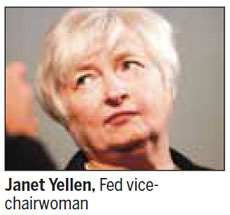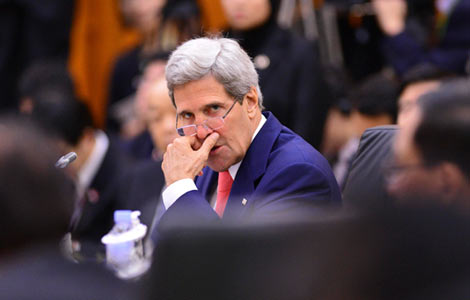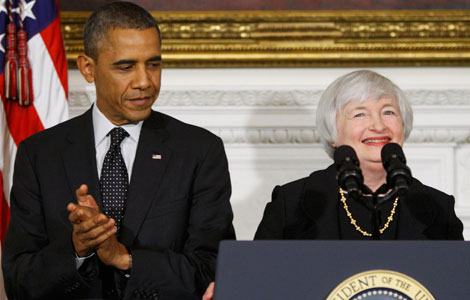Yellen 'to maintain continuity' at US Fed
Updated: 2013-10-10 07:21
By Zheng Yangpeng in Beijing and Zhang Yuwei in New York (China Daily)
|
||||||||

Janet Yellen's nomination to run the United States Federal Reserve sends a positive signal to the global and Chinese economies, analysts have said.
President Barack Obama will nominate Fed Vice-Chairwoman Yellen on Wednesday to lead the world's most influential central bank.
If Obama's choice is confirmed by the US Senate, which is expected to endorse her, she will likely guarantee the continuity of the policies established under Ben Bernanke, analysts said.
Douglas Borthwick, managing director of the New York-based Chapdelaine Foreign Exchange, said the new chairwoman will most likely carry on existing policies.
"Yellen will follow the programs first designed by Fed Chairman Bernanke," said Borthwick. "For as long as the US lacks leadership regarding the level of debt, QE will continue. And as long as the US economy continues to exhibit lack of growth, QE is likely to continue."
"Compared to Lawrence Summers, she is much softer and more accepted by the market. I think she would lead the Fed very well," said Xu Hongcai, a senior finance researcher at the China Center for International Economic Exchanges, a Beijing-based think tank.
Xu said the US' current quantitative easing program - an $85-billion-a-month bond-buying program to stimulate the economy - will be scaled back and halted. It might even be wound down under Bernanke, as long as economic data meet the objectives set.
The Fed has stated its commitment to keep rates steady at least until the US jobless rate hits 6.5 percent, as long as inflation does not threaten to pierce 2.5 percent. The US added 169,000 new jobs last month and the unemployment rate was at 7.3 percent.
"Taper is off the table, and unlikely to return to the US discussion until employment and housing data significantly move to the upside," said Borthwick. "The US dollar is likely to weaken."
The easing of fears of an imminent scaling back of the QE program is helpful for the stabilization of investors' expectations, which is good for China's economy, domestic analysts said. That fear had previously loomed large on the country's capital markets.
And this might also reduce the fears hanging over emerging economies, such as India and Indonesia, which were hurt by that anticipation, according to Tan Xiaosu, an international finance professor at the Central University of Finance and Economics in Beijing.
But he cautioned that since the winding down of the QE will come sooner or later, China has to prepare for the possible consequences, including the decline of foreign capital inflows and yuan devaluation. Even though the market has digested some of the impact beforehand, the impact will still be there when the tapering off process really does happen, he said.
Xu said that, while the negative side of the tapering off process has been punctured by the market, there will be also a positive side for China's economy. To begin with, the easing of the ultra-easy monetary policy will give more flexibility to the Chinese central bank's domestic monetary policy decisions. Now, the central bank has to keep a parallel easy monetary policy as a reaction to the US' monetary policy.
Most Viewed
Editor's Picks

|

|

|

|

|

|
Today's Top News
China calls for social reconciliation in Egypt
Obama 'likely' to sign debt extention bill
Kerry says US will work to end fiscal crisis
Asian 'safety net' stressed
90% US firms make profits in China
Currency swap signed a 'landmark'
Libyan PM released
Trending news across China
US Weekly

|

|















